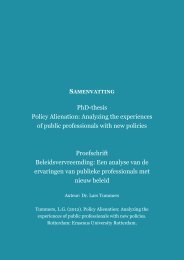PhD-thesis Policy Alienation: Analyzing the ... - Lars Tummers
PhD-thesis Policy Alienation: Analyzing the ... - Lars Tummers
PhD-thesis Policy Alienation: Analyzing the ... - Lars Tummers
Create successful ePaper yourself
Turn your PDF publications into a flip-book with our unique Google optimized e-Paper software.
289 | A P P E N D I X 1<br />
As with a structured interview, a set of <strong>the</strong>mes is selected in advance. However, unlike a<br />
structured interview, a semi-structured interview is flexible, allowing new questions to be<br />
raised during <strong>the</strong> interview based on <strong>the</strong> answers from a respondent. The exact content of <strong>the</strong><br />
interview will depend, among o<strong>the</strong>r things, on <strong>the</strong> research question, <strong>the</strong> policy and <strong>the</strong><br />
sector involved, and on <strong>the</strong> individual characteristics of <strong>the</strong> interviewer and interviewee.<br />
What is shown here is a very general interview protocol for policy alienation, with a focus on<br />
<strong>the</strong> degree of policy alienation and its influencing factors. More specific interview protocols<br />
for <strong>the</strong> various cases have been developed.<br />
Introduction<br />
- State <strong>the</strong> goals of <strong>the</strong> interview and <strong>the</strong> goal of <strong>the</strong> research<br />
- Check if audio recording is allowed<br />
- Discuss anonymity issues with respondent<br />
- State general outlines of <strong>the</strong> research<br />
- Discuss outline of <strong>the</strong> interview, for example:<br />
o The interview concerns <strong>the</strong> experiences of public professionals with new<br />
governmental policy, in this case [here: policy X]. The interview considers (a) to what<br />
extent you, as a public professional, can identify with policy X? and (b) which factors<br />
influence this identification/alienation with <strong>the</strong> policy, and (c) what are <strong>the</strong> effects of<br />
this identification/alienation with <strong>the</strong> policy?<br />
General - Respondent<br />
- General information about <strong>the</strong> interviewee: Could you please say something about<br />
yourself (age, education, profession, number of years in profession, etc.)?<br />
- Role as a professional: What are your experiences as a professional, how do you<br />
experience your work?<br />
General – <strong>Policy</strong> X<br />
Context<br />
- What do you think are <strong>the</strong> most important changes which have happened as a result of<br />
<strong>the</strong> introduction of <strong>Policy</strong> X (in general and for implementing professionals in<br />
particular)?<br />
Influence on work<br />
- How does this influence your work?<br />
View on policy<br />
- What do you think of policy X?<br />
- Why do think in this way about <strong>the</strong> policy?<br />
<strong>Alienation</strong>/identification<br />
- To which extent can you identify with policy X?<br />
- Why can you (not) identify with policy X?<br />
289



